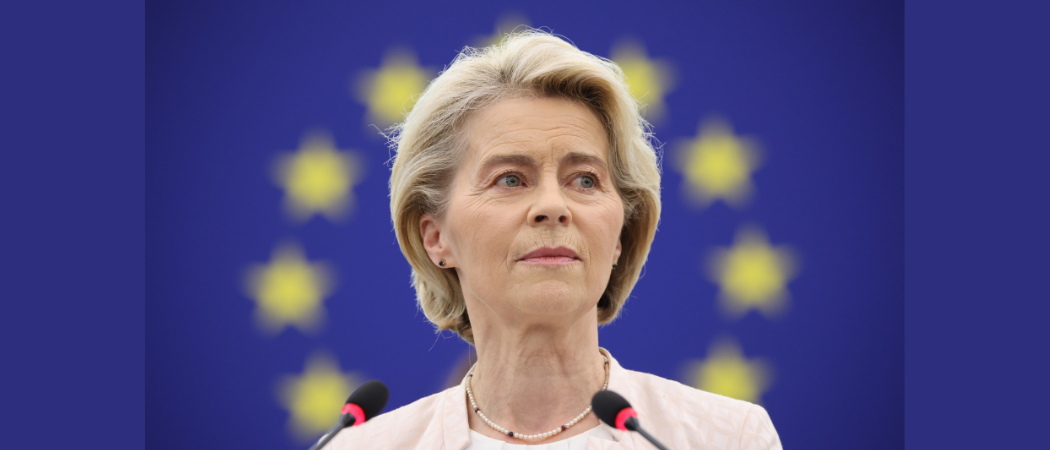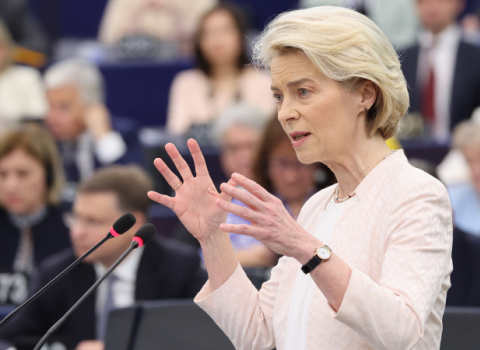As Ursula von der Leyen is re-elected as president of the European Commission, she promises to expand the ERC and the EIC

Commission president Ursula von der Leyen giving her speech before the European Parliament in Strasbourg ahead of her re-election. Photo credits: Christophe Licoppe / European Union
Ursula von der Leyen promised to put research and innovation “at the centre of our economy” as she laid out her plans for the next five years, before the European Parliament voted to confirm her second term as president of the European Commission.
A total of 401 MEPs voted in favour of von der Leyen’s re-election this afternoon, and 284 voted against, making for a more comfortable majority than her first vote in 2019.
There was no mention of research in her speech to MEPs before the vote, but in her political guidelines published this morning, von der Leyen pledges to increase the EU’s research spending, and “expand” the European Research Council (ERC) and the European Innovation Council (EIC).
The ERC delivers grants to support primarily early-stage research, with a budget of more than €16 billion under Horizon Europe. French president Emmanuel Macron has called for the ERC to be reinforced, and ERC president Maria Leptin recently urged grant holders to lobby politicians for more funding.
The EIC supports researchers and innovators with grants and equity investments. Its €10.1 billion budget until 2027 makes it one of the biggest deep tech investors in the world, but its president has stressed the need for additional funding.
Meanwhile MEPs and the research community have been calling for the Horizon Europe budget to be doubled to €200 billion in the next framework programme, as member states continue to show no signs of spending 3% of GDP on R&D, targets which were proposed back in 2003.
Von der Leyen also wants to launch new public-private partnerships, propose a European biotech act next year as part of a wider life sciences strategy, and strengthen the university alliances designed to deepen cross-border links between institutions.
Leptin said von der Leyen’s appointment would provide much-needed continuity, and she is “very pleased” with the commitment to increase research spending with a focus on fundamental research, scientific excellence, and disruptive innovation, and to expand the ERC.
“In the ERC competitions, we can now only fund 60% of excellent proposals; increased funds would certainly help to close this gap and further curb the brain drain from Europe,” Leptin said. “What’s more, there is a need to increase the funding given to ERC grantees as the grant sizes have not changed since the creation of the ERC in 2007, despite inflation.”
Eszter Lakos, newly elected Hungarian MEP who previously worked as a science and technology diplomat in Brussels and represented Hungary in the Council of the EU during negotiations for Horizon Europe, told Science|Business that she welcomes von der Leyen’s call to increase the R&I budget.
However, “numbers are important,” she said, recalling that the current Horizon Europe budget is far short of what it would have taken to fund all the excellent research proposals it received.
Also, according to Lakos, one question to be clarified is how much research will remain at the heart of the framework programme.
“The research side is not to be forgotten because it is at the root and upstream of innovation,” Lakos said.
Good news for research
Von der Leyen’s appointment is “good news for research in Europe,” said Christian Ehler MEP, who was a co-rapporteur for Horizon Europe. The support for the ERC and EIC and the pledge to increase R&I investments bode well for the next framework programme, FP10, he said.
“I believe her commitments to provide the circumstances for researchers to thrive, to create new public-private partnerships and to focus on strategic priorities indicate that FP10 can be different of nature than Horizon Europe by being more focussed and less complex,” Ehler told Science|Business.
“The only issue I would like to be emphasised more in the mission letter to the new Commissioner is European values in research, particularly the protection of the freedom of scientific research and our commitment to supporting researchers at risk.”
Sovereignty fund?
Addressing the European Parliament this morning ahead of the decisive vote, von der Leyen promised to make prosperity and competitiveness her top priority. “This mandate has to be the time of investment,” she said.
Central to that strategy is the proposal for a European Competitiveness Fund to be included in the EU’s next long-term budget, to invest in strategic technologies such as artificial intelligence, space, clean tech and biotech.
It is a similar concept to the EU sovereignty fund von der Leyen first pitched last year, before member states refused to hand over fresh money. A reinforced budget for the 2028-2034 period could allow that idea to finally come to fruition, although negotiations will not be easy. The fund will focus on cross-border projects, and will support the Important Projects of Common European Interest (IPCEIs), which von der Leyen wants to make simpler and faster.
“The fundamentals of the global economy are changing, those who stand still will fall behind, those who are not competitive will be dependent,” she told MEPs.
According to von der Leyen, the European Single Market needs to ease bureaucracy and increase public and private investment “from farming to industry, from digital to strategic technologies but also more investment in people and their skills”.
The strategy puts at its centre European start-ups and SMEs, for which von der Leyen proposed to introduce a revamped SME and competitiveness check to get rid of burdensome micromanagement and give companies better incentives.
She proposed to ask each commissioner to work on this, appointing a vice-president to report on progress to the Parliament once a year.
Von der Leyen's strategy echoes that proposed by former prime minister Enrico Letta in his high-profile report released in mid-April.
As Letta set out, the current fragmentation of the single market hinders SMEs in numerous ways, including administrative burdens like business law and the taxation system. Reducing these obstacles and harmonising state aid rules would boost SMEs’ access to support and improve European R&I, he said.
In her speech, von der Leyen addressed the innovation race against US and Asia. She said the EU should boost its liquid capital market and adopt a competition policy that can support start-ups to scale up, without pushing companies to look for funding abroad to finance their expansion. “Europe must be the home of opportunity and innovation,” she said.
As well as completing the Captital Markets Union, von der Leyen wants to deliver Letta’s idea of a European Savings and Investments Union. “Every year, €300 billion of European family savings go from Europe to foreign markets because our capital markets are too fragmented. This money is often used to buy European innovative companies from abroad and the companies leave. This has to change,” she said.
Clean Industrial Deal
A new Clean Industrial Deal to decarbonise and bring down energy prices will also be put forward in the first 100 days of the mandate. The initiative is designated to channel investment in infrastructure and industry, in particular for energy-intensive sectors, von der Leyen said.
“This will help create lead markets in everything from clean steel to clean tech and it will speed up planning, tendering, and permitting,” and enable the EU to “break free from dirty Russian fossil fuels,” she said.
This will also involve enshrining the target of reducing carbon emissions by 90% by 2040 into law. The initiative represents a renewed commitment to the Green Deal, but a shift in focus towards implementation and investment.
CERN for AI
In her political guidelines, von der Leyen is also pledging to step up investment in cutting-edge technologies, “in particular supercomputing, semiconductors, the Internet of Things, genomics, quantum computing, space tech and beyond”.
When it comes to artificial intelligence, the guidelines mark a shift from regulation to innovation. The new commission will develop an “apply AI strategy” alongside member states, industry and civil society to support industrial and public service applications of AI.
The president will propose setting up an AI Research Council to pool resources, picking up the idea of a CERN for AI, a concept that recently received the backing of the Commission’s scientific advisors.
“It’s great to see this proposal is now gaining traction,” said Nicole Grobert, chair of the group of chief scientific advisers. “We need to make sure that we think carefully about how an AI institute is designed, because it really matters. It should provide fair access to massive high-performing computational power, a sustainable cloud infrastructure, funding for research with AI and AI training programmes for researchers in all disciplines to explore and adopt AI in their sciences.”
Defence union
The most rousing section of von der Leyen’s speech was when she reaffirmed the EU’s support for Ukraine, and the need to invest more in Europe’s security and defence. “I do believe it is now time to build a veritable defence union,” she told MEPs, urging support for common European projects such as a “complete air defence system”.
She goes further in the political guidelines, promising to appoint a Commissioner for Defence, and to present a white paper on the future of European Defence in the first 100 days of the mandate to set out the new approach and identify investment needs.
In the document she pledges to reinforce the European Defence Industry Programme, designed to incentivise common procurement, and the European Defence Fund (EDF), which supports cross-border innovation projects.
Paulius Saudargas, a newly-elected Lithuanian MEP in von der Leyen’s EPP group with a PhD in biophysics, welcomed the outcome of the vote and the president’s R&I agenda. “I agree that research and innovation must be put at the core of our economy. It is the recipe for the competitive and prosperous EU,” he told Science|Business.
Saudargas believes special attention should be paid to security and defence, including support for collaborative R&I projects in defence technologies, and he was pleased to note the mention of a European Defence Union and a single market for defence.






 A unique international forum for public research organisations and companies to connect their external engagement with strategic interests around their R&D system.
A unique international forum for public research organisations and companies to connect their external engagement with strategic interests around their R&D system.